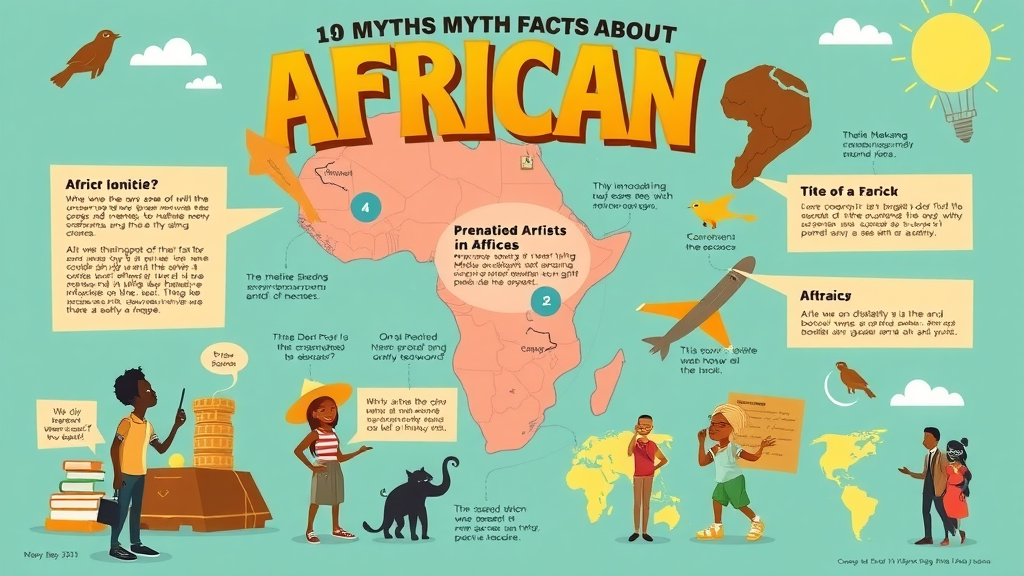In the realm of economic growth, a startling statistic reveals that Africa's productivity has plummeted over the past decade, landing at an alarming low of just 0.8% growth annually. This critical issue serves as a wake-up call for a continent poised for potential but shackled by overarching productivity challenges. In this article, we will explore the current economic landscape of Africa, the pressing productivity crisis, the transformative role of digital technology, and key strategies for fostering sustainable growth.
Overview of Africa's Economic Landscape

Africa boasts a diverse economic landscape, rich in resources and opportunities. With a GDP exceeding $3 trillion, this vibrant continent has the potential to become a leading player in the global economy. However, various factors such as inadequate infrastructure, political instability, and ongoing challenges in productivity inhibit growth. The stark reality is that many countries in Africa continue to lag behind other regions in key productivity metrics, impacting overall economic growth. An assessment of Africa’s economic landscape reveals not only potential but also substantial hurdles that need addressing for a brighter economic future.
The Productivity Crisis in Africa
Current State of Productivity

According to Acha Leke, Senior Partner at McKinsey & Company, "Productivity across the board is incredibly low in Africa." This chilling acknowledgement brings to light a persistent struggle across various sectors including agriculture, manufacturing, and services. Over the past decade, productivity growth has significantly declined, diminishing from 2.2% annually (2000-2010) to a mere 0.8%. Alarmingly, Africa's real GDP per capita has only increased by 1.1% since 1990, with more than 60% of its population living in poverty.
This stagnation in productivity is not just a statistical anomaly; it poses a substantial risk to millions of livelihoods. Projections indicate that by 2030, Africans will constitute over 80% of the world's poor unless urgent action is taken to reverse this trajectory. The dire statistics clearly indicate a need for innovative approaches to improve productivity across the continent.
Impact of Low Productivity on Economic Growth
The low levels of productivity in Africa critically undermine economic growth potential. A productive workforce is the cornerstone of a successful economy. However, the contiguous cycle of low productivity leading to slow economic expansion creates a significant impediment to improving the socio-economic conditions of the population. Reduced productivity leads to slow job creation, which in turn exacerbates poverty and inequality. Addressing these productivity challenges is vital for leveraging Africa’s potential for economic prosperity.
The Role of Digital Technology in Transforming Productivity
Success Stories of Digital Transformation

Digital technology holds promise as a catalyst for productivity transformation in Africa. With 60% of the world’s mobile banking accounts residing in the continent, digital advancement in financial services is a compelling illustration of this potential. Additionally, Leke cites the digitization of government services in Togo during COVID-19, which remarkably quadrupled revenue while reducing leakage. Such success stories highlight how digital tools can enhance efficiency in various sectors, laying the groundwork for broader economic impacts.
Moreover, agriculture is benefiting from digital technology as innovative solutions help farmers minimize post-harvest losses, thereby increasing productivity. Digital platforms provide opportunities for education and training at scale, paving the way for a more skilled workforce that can address Africa’s economic challenges.
Challenges and Limitations of Digital Solutions
Despite the promising outlook, the digital revolution in Africa faces challenges. Not all regions have equal access to technology, and the existing infrastructure may not support widespread digital adoption. Moreover, reliance on technology can inadvertently widen the gap between urban and rural populations, reinforcing existing inequalities. It is crucial for policymakers to take a holistic approach that also focuses on infrastructural development, ensuring that all communities have the opportunity to leverage the benefits of digitalization.
Human Capital: The Key to Economic Development
Investing in Education and Skills

Human capital development is paramount in driving economic growth in Africa. Investing in education and skill-building initiatives is essential to cultivate a workforce equipped for the demands of a modern economy. Educational institutions must adapt their curricula to focus on critical thinking, technical skills, and digital literacy to prepare students for the future job market.
Programs that integrate technology into learning environments can foster innovation and creativity among students. By prioritizing education and upskilling, Africa can harness its youthful demographic as a strategic advantage in the global economic landscape.
The Young Workforce: A Boon for Africa's Future

Africa’s burgeoning young workforce presents an unprecedented opportunity for growth. By 2050, the continent is projected to have the world’s largest and youngest workforce. This demographic shift can provide the impetus needed to drive economic transformation and productivity improvement. However, it is essential to channel this potential effectively through targeted investments and initiatives that empower young people to thrive in the workforce.
Inclusive Growth: Bridging the Economic Divide
Strategies for Inclusive Economic Growth
For Africa to realize its economic potential, inclusive growth strategies are essential. These strategies should focus on integrating marginalized groups into the economic fold, providing equitable access to resources, and fostering environments ripe for entrepreneurship. Initiatives that support small and medium-sized enterprises (SMEs) can stimulate innovation and job creation, ensuring that growth benefits a broader range of the population.
The Importance of Regional Trade and Cooperation

Regional trade and cooperation offer viable pathways to enhance economic productivity. Strengthening intra-African trade alliances can foster collective economic growth, reducing reliance on external markets. Initiatives such as the African Continental Free Trade Area (AfCFTA) are steps in the right direction, enabling nations to collaborate and build economic resilience. For instance, the DRC Port Project by DP World and Mota-Engil is a significant move towards revolutionizing trade routes, enhancing logistics, and boosting regional trade.
Expert Insights on Africa's Economic Future
Acha Leke's Perspective on Productivity
Acha Leke, Senior Partner at McKinsey & Company, provides a critical perspective on Africa's challenges and opportunities. He underscores the urgency of addressing low productivity as the continent's central issue. In his view, digital technology could serve as a transformative lever, propelling Africa into a new economic reality.
The Global Implications of Africa's Economic Growth
Leke emphasizes that improving productivity in Africa is not solely a regional concern, but a global imperative. With the continent expected to contribute significantly to the world’s workforce and talent pool, investing in Africa’s economic growth translates into broader global benefits. Leke argues, "If we get this right, the biggest export from the continent is no longer going to be our resources. It's going to be our people." This vision encapsulates the transformative potential of Africa's young and dynamic population.
Acha Leke, Senior Partner at McKinsey & Company, states, "If we get this right, the biggest export from the continent is no longer going to be our resources. It's going to be our people."

Common Misconceptions About Africa's Economy
Debunking Myths Surrounding African Economies

Misinformation often clouds perceptions of Africa’s economic landscape. Common myths—such as the belief that all African countries are mired in poverty and conflict—can overshadow the continent's diverse economies and successes. Debunking these myths is crucial to fostering a more nuanced understanding of Africa’s economic potential.
Understanding the Diversity of Economic Performance
African economies are not monolithic; they exhibit significant diversity in performance and potential. Countries like Nigeria, South Africa, and Kenya have shown remarkable resilience and growth prospects. By highlighting the varying trajectories of African nations, we can paint a more accurate picture of the continent’s economic landscape. For example, Kenya's economic growth is being challenged by rising business costs and tax burdens, which are critical issues that need addressing to sustain its economic momentum.
Actionable Steps for Improving Productivity
Policy Recommendations for Governments

Effective policies are essential to addressing Africa's productivity challenges. Implementing strategies that prioritize infrastructure development, expand digital access, and support education reform can create a conducive environment for economic growth. Policymakers must collaborate with the private sector to drive innovation and accountability in development initiatives.
Encouraging Private Sector Innovation
Fostering a culture of innovation within the private sector is vital for cultivating a more productive economy. Investment in research and development, coupled with incentives for technological adoption, can spur growth and encourage local entrepreneurship. Supporting startups and innovation hubs will ensure that Africa can harness its creativity and entrepreneurial spirit to overcome economic hurdles. The Hanseatic acquisition of CNMP is a strategic move that enhances logistics opportunities, demonstrating how private sector initiatives can significantly impact economic productivity.
People Also Ask
What is the economic future of Africa?
The economic future of Africa hinges on addressing productivity challenges, leveraging digital technologies, and investing in human capital. By fostering these areas, the continent can realize its vast potential.
Which African country is doing well economically?
Countries such as Kenya and Rwanda have shown impressive economic growth through innovation and infrastructure development, positioning them as leaders in the region.
What is the economic outlook for Africa in 2025?
The outlook for Africa in 2025 is cautiously optimistic, provided that productivity initiatives are implemented effectively. A focus on boosting human capital and embracing digital technologies will be integral to achieving growth targets.
Which is the richest country in Africa in 2025?
Predictions indicate that Nigeria and South Africa are likely to remain among the richest nations in Africa, thanks to their resource wealth and diversified economies.
Conclusion: The Path Forward for Africa's Economy
In summary, the future of Africa's economy is contingent upon addressing persistent productivity challenges, optimizing the use of digital technology, and investing in its young population. The path forward requires a collaborative effort among governments, private sectors, and educational institutions to build a sustainable, inclusive economic environment that can empower individuals and communities alike.
Call to Action: Discover Afridigest
For more insights on Africa’s economic potential and strategies for growth, subscribe to Afridigest today! Join us in building a valuable platform for entrepreneurs across Africa and stay informed with the latest ideas, analysis, and insights.
 Add Row
Add Row  Add
Add 




Write A Comment